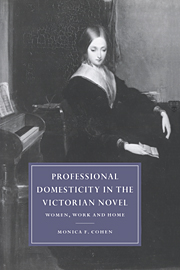Book contents
- Frontmatter
- Contents
- Acknowledgments
- Introduction
- 1 Persuading the navy home: Austen and professional domesticism
- 2 Homesick: the domestic interiors of Villette
- 3 Dickens I: Great Expectations and vocational domesticity
- 4 Dickens II: Little Dorrit in a home: institutionalization and form
- 5 Professing renunciation: domesticity in Felix Holt
- 6 A prejudice for milk: professionalism, nationalism and domesticism in Daniel Deronda
- Afterword
- Notes
- Selected bibliography
- Index
- CAMBRIDGE STUDIES IN NINETEENTH-CENTURY LITERATURE AND CULTURE
- Frontmatter
- Contents
- Acknowledgments
- Introduction
- 1 Persuading the navy home: Austen and professional domesticism
- 2 Homesick: the domestic interiors of Villette
- 3 Dickens I: Great Expectations and vocational domesticity
- 4 Dickens II: Little Dorrit in a home: institutionalization and form
- 5 Professing renunciation: domesticity in Felix Holt
- 6 A prejudice for milk: professionalism, nationalism and domesticism in Daniel Deronda
- Afterword
- Notes
- Selected bibliography
- Index
- CAMBRIDGE STUDIES IN NINETEENTH-CENTURY LITERATURE AND CULTURE
Summary
In 1871, George Eliot called the Victorian novel a “home epic” and identified the familial household as the primary “bourne” of nineteenth-century English narrative (Middlemarch 890). Several years later, that household is legible only by virtue of a homeless Jewish artist's appreciation, and that bourne figures as a national territory. The narrative inclusion of professional art and of international intellectualism seems to have directed literary domestic lines of development towards a collective ideal absent in the British novel since Sir Walter Scott: the national homeland.
Professional domesticity began by reconsidering a set of truisms literary critics have borrowed from social historians about nineteenth-century domesticity. It has argued that domestic tropes work to represent the home as a vocational calling and the novel form itself as a practice of ethical and social knowledge at a time when many novelists were beginning to shape their careers around an idea of intellectual property, and many feminists were using communitarian definitions of the house-hold to expand the middle-class woman's “private” sphere. By forging spaces of nonpersonal sociability and by playing peek-a-boo with received definitions of “institution,” the domestic novels under study here invite rethinking some of the binaries that have characterized the home in Anglo-American culture: leisure against work, private against public, female against male, consumption against production. Most importantly, they invite placing the idea of the home on a continuum of professionalism, which changes how we understand Victorian domestic ideology. In the course of demonstrating formal anxiety about introversion and inferiority, these novels suggest a great deal of cultural ambivalence towards nineteenth-century individualism.
- Type
- Chapter
- Information
- Professional Domesticity in the Victorian NovelWomen, Work and Home, pp. 186 - 187Publisher: Cambridge University PressPrint publication year: 1998



